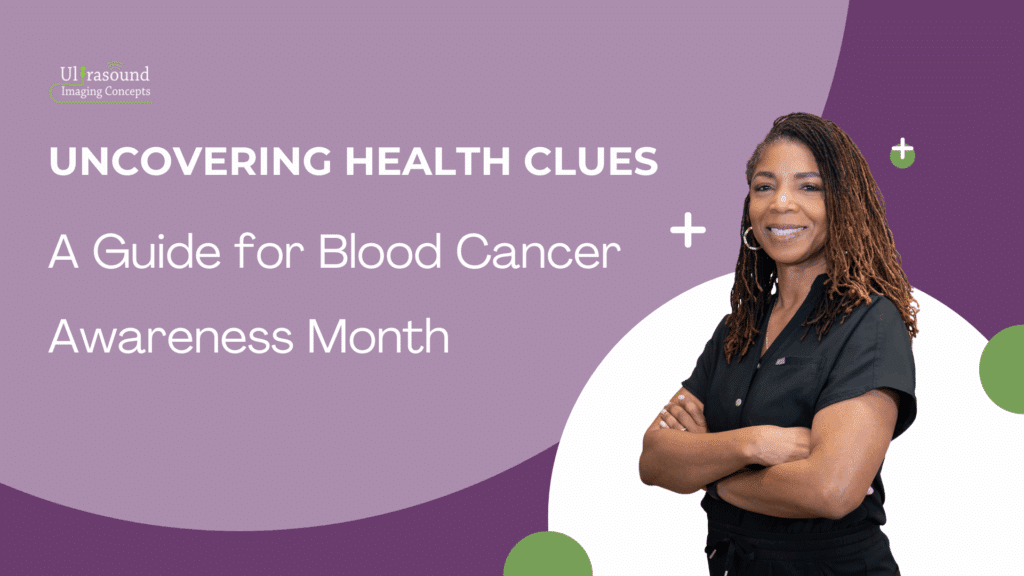Every September, we recognize Blood Cancer Awareness Month as a time to focus on education, support, and the importance of listening to our bodies. While blood cancers like leukemia and lymphoma are complex diseases, understanding how to be proactive about your health is a powerful first step.
Many symptoms of blood cancer can be subtle, but your body often leaves unseen clues. The key is knowing how to look for them. While a final diagnosis always comes from a specialist through blood tests and biopsies, non-invasive imaging like ultrasound plays a vital role in flagging these clues and seeing the complete picture of your health.
The First Clue: How Abdominal Ultrasound Helps
Blood cancers originate in the bone marrow or lymphatic system, but their effects can ripple throughout the body. For instance, leukemia and lymphoma can cause your spleen and liver to become enlarged, a condition doctors call splenomegaly or hepatomegaly. You might not feel this change yourself, but it’s a significant physical sign that something is wrong.
This is where an abdominal ultrasound becomes an invaluable tool. Our sonographers get a clear view of these vital organs in a quick, painless, and radiation-free exam. We can measure their size and assess their texture, providing critical information.
Think of it as a window into your body. While an ultrasound can’t diagnose cancer on its own, detecting an enlarged organ is a major clue that tells your doctor, “We need to investigate this further.” It’s a pivotal first step that can lead to a much earlier diagnosis and more effective treatment.

A Systemic Approach: Your Blood Health is Connected to Your Whole Body
Being proactive means looking beyond just one symptom. Your health is a connected system. The blood that may be affected by cancer is the same blood that flows through every artery and vein, sustaining your heart, brain, and limbs. Factors that impact one part of your health can easily affect another.
This is why a systemic view is so important. Many risk factors for cardiovascular disease, like age, smoking history, or diabetes, are also general concerns for a person’s overall cancer risk. Taking a proactive approach means monitoring the entire system, not just waiting for a problem to appear.

Expanding the View: Proactive Screenings for Total Peace of Mind
Just as an abdominal ultrasound examines your organs, other preventative screenings provide a vital status check on your body’s circulatory “highways.”
At Ultraview Imaging, we use the same safe, non-invasive technology to offer screenings that build a complete picture of your health:
ABI (Ankle-Brachial Index) Screening: This simple test compares the blood pressure in your ankle to the pressure in your arm to check for circulation issues in your legs, known as Peripheral Artery Disease (PAD). Symptoms like leg pain or fatigue can be vague, and an ABI test helps your doctor pinpoint the cause.
Carotid Ultrasound & Aorta Ultrasound Screening: Your carotid arteries and aorta are the main pipelines for blood flow to your brain and body. These screenings look for plaque buildup (atherosclerosis) or dangerous bulges (aneurysms). A clear picture of these vessels is a cornerstone of proactive health and stroke prevention.

Who Should Consider Preventive Screenings?
Taking a proactive step with preventative ultrasound is a powerful way to gain a health baseline. These screenings are ideal for individuals over 55 or anyone 40+ with certain health risks, including:
- High-stress levels
- A family history of heart disease or stroke
- Current or past smoking history
- High blood pressure or high cholesterol
- Diabetes
- A sedentary lifestyle or obesity

Be Proactive, Not Reactive
This September, we encourage you to take control of your health narrative. Listen to your body, speak with your doctor about any persistent symptoms, and consider being proactive with a wellness screening. Early detection—whether of an enlarged spleen or a blocked artery—is the key to better outcomes and lasting peace of mind.
Ready to take a proactive step? Contact Ultraview Imaging today to learn more about our preventative screening packages.

